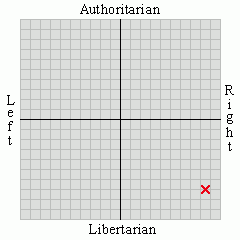All you need to know about the 55% rule
Much debate this week about the proposed 55% rule, in the media and in the Blogosphere.
The majority of commentators are either vehemently against it purely because it was suggested by the Tories (or the Lib Dems) or are enthusiastically for it because it was suggested by the Tories (or the Lib Dems).
Everybody is shouting that everybody else either doesn't understand the rule, or does understand it, but doesn't want anyone else to.
The best summary CF has seen in his travels was not on a blog, but in a comment to a blog post.
Commenter 'Morlock' (the author of the post he was commenting on vehemently, vocally detests the whole 'hat tip' process, so no link will be given), had the following neat summary:
"1. Government != parliament
2. Fixed term parliaments != fixed term governments
3. This 55% does seem to be a short-term 'fix' for the current situation
4. If you support fixed-term parliaments, a 'super majority' for dissolution makes impeccable sense
5. This takes power away from the governing party
6. The super majority ought to be higher (finger in the air, time; say 2/3)
7. If a situation arose where government was neutered (simple majority against, but not enough against to force dissolution), no legislation would be possible. As a libertarian, what's not to like about that particular situation?
Bottom line: if we have fixed term parliaments, super majority dissolution helps ensure they stay fixed term. It also transfers power from the government to parliament. The only thing not to like here is that the 55% has been chosen with short-term interests in mind; it really should be larger."
There, that's that sorted, right?
.
The majority of commentators are either vehemently against it purely because it was suggested by the Tories (or the Lib Dems) or are enthusiastically for it because it was suggested by the Tories (or the Lib Dems).
Everybody is shouting that everybody else either doesn't understand the rule, or does understand it, but doesn't want anyone else to.
The best summary CF has seen in his travels was not on a blog, but in a comment to a blog post.
Commenter 'Morlock' (the author of the post he was commenting on vehemently, vocally detests the whole 'hat tip' process, so no link will be given), had the following neat summary:
"1. Government != parliament
2. Fixed term parliaments != fixed term governments
3. This 55% does seem to be a short-term 'fix' for the current situation
4. If you support fixed-term parliaments, a 'super majority' for dissolution makes impeccable sense
5. This takes power away from the governing party
6. The super majority ought to be higher (finger in the air, time; say 2/3)
7. If a situation arose where government was neutered (simple majority against, but not enough against to force dissolution), no legislation would be possible. As a libertarian, what's not to like about that particular situation?
Bottom line: if we have fixed term parliaments, super majority dissolution helps ensure they stay fixed term. It also transfers power from the government to parliament. The only thing not to like here is that the 55% has been chosen with short-term interests in mind; it really should be larger."
There, that's that sorted, right?
.

















6 comments:
Yep, that about sums it up, but you'll still have those on either side screaming that it's right/wrong dependent on party allegiance.
Hallelujah - I've been trying to explain to family/friends that the 55% rule actually is a GOOD thing; no more of this nonsense where the incumbent Govt decide to call an election when their poll ratings are favourable. The 55% rule is real, grown-up politics - what's NOT to like? I'd venture that those who dislike it don't actually understand it!
In my opinion it is a good idea if you like the notion of a fixed parliament. I can understand that the markets need to be reassured at the moment that things will not go belly up at the first hurdle - we need an element of stability and reassurance that things are not likely to get weirder at the drop of a hat.
In my own opinion the 55% needs to be 66%.
Damn you - you've said everything I would want to say only better!
It's a shame there's so much partisan nonsense going on out there.
About point 7: this unfortunately cuts both ways - perhaps no new legislation (good), but no repeal of existing interfering-state-type legislation either (bad).
Quite clear and a good idea.
I don't agree with point 7 though. I presume if a private members bill was put forward then a simple majority of MPs could pass it. One of the simplist bills would be one repealing a piece of existing legislation.
Post a Comment